Learn from the research presentations I had here and abroad , individually and with other authors.
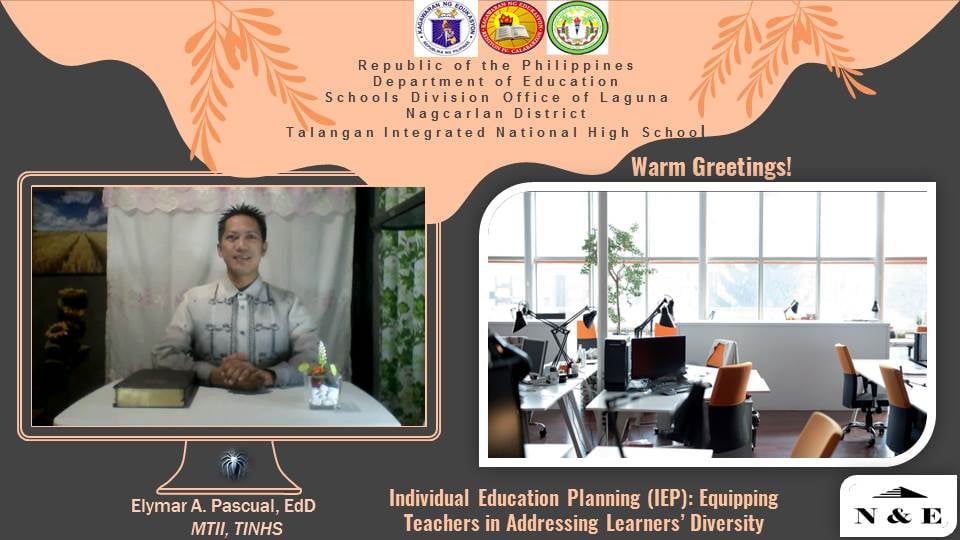
Individual Education Planning: Equipping Teachers in Addressing Learners' Diversity
Individual Education Plan (IEP) has been in the educational setting since 2001 and was popularized by United Kingdom and Canada. It began with the concept of bringing education to special children who have specific needs, and later was adopted by institutions as strategy of meeting different needs of learners. It's a strategy of bringing individual education to each learner through compilation of information and records of dealings between teacher, parents and learner. With the onset of the new Philippine Professional Standards for Teachers last 2018, the challenge of addressing learners' diversity and collaborating with parents to attain utmost learning experience from the students was laid down. This study was conducted to explore the benefit of using individual education planning to the performance of learners in school. Particularly, the author wanted to build on home visitation, learner's cardex of needs-progress-achievement, and homeroom guidance program as three ensuring ways of constructing profile to possibly address learners' diversity.

Homeroom Symposium and Calamity Response Level of Senior High School Learners
The second semester of the school year 2019 - 2020 was bombarded with different calamities and pandemic that hamper school days. This study sought to determine the significant difference of calamity response level of senior high school learners of Talangan Integrated National High School, Nagcarlan, Laguna, when measured across sex groups, family income status and academic performance. With the conduct of monthly homeroom symposium that dealt with non-academic topics such as reaching out to people, continuing life in the midst of adversities, and developing full potential as God's stewards, the author also measured the relationship of homeroom symposia application and calamity response level of learners.

Tangram Proficiency Leading to Numeracy Skills Enhancement
This study focused on determining the ways in which numeracy skills are enhanced through tangram. An exploration on ways of solving patterns in tangram, power of imagination, enhancement of logical, analytical and critical thinking, and desirable characteristics being formed in playing tangram became part of this study. The community quarantine in the Philippines due to COVID-19 caused the design of this study to gather data through online tangram tournament. Seven learners accepted the seven-day challenge. They solved 55 tangram puzzles and answered 6 qualitative questions. After a week of tangram challenge, significant findings were established.
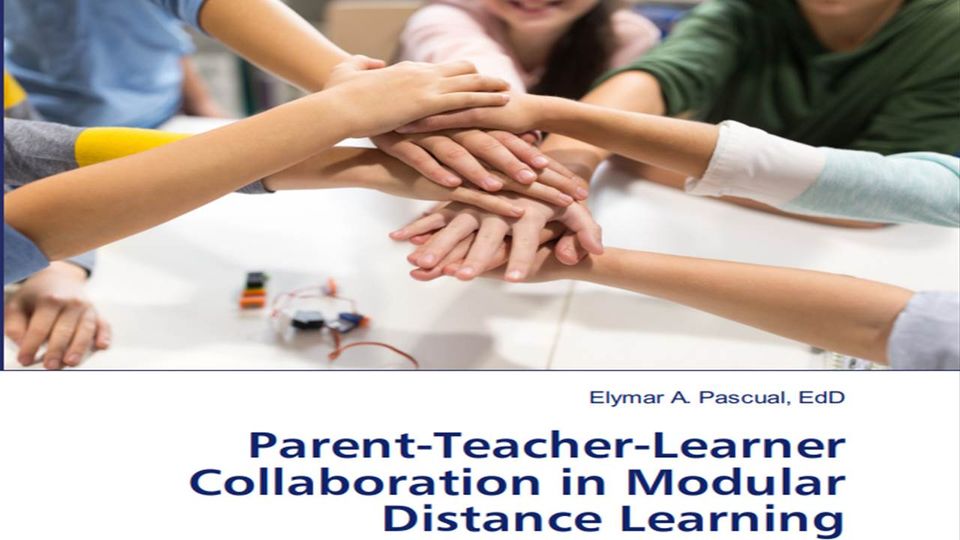
Parent-Teacher-Learner Collaboration in Modular Distance Learning
In the advent of pandemic due to COVID 19, modular distance learning became the mostly implemented approach in many schools in the Philippines - the school prepares and distributes learning materials, students stay at home and perform learning tasks, while parents assist in supervision. This study dealt with the role of parents, teachers and learners as they collaborate and bring about the best in education amidst pandemic. Fifteen respondents constituting of parents, teachers and learners participated in this qualitative exploration. Ten questions were solicited through Google forms on a weekly interval as the modular distance learning was being implemented in Talangan Integrated National High School, Nagcarlan, Laguna. Qualitative questions pertaining to parents' assistance and supervision, preparation of module and supplemental materials, provision of feedbacks, and learning habits were sent for the respondents to share ideas based on their experiences. Themes developed encompassed parents', teachers' and learners' contribution in collaboration.

Reaching Out to Returning Students amidst Pandemic
Some learners who had untoward experience in life turn out to be school leavers, either by their own choice or through circumstance they did not expect. Returning after a year or more of being out of school is a new beginning for them. This study focused on investigating the experience of returning students amidst time of pandemic. Twelve returning students from grades 8 to 11 became the participants in this exploration. Through social media connectivity, the researchers provided assistance to them in terms of peer tutoring in different subjects, having to stay at home while doing modular tasks due to COVID 19. Seven qualitative questions were given on a weekly interval for the participants to share their experience and idea on how returning learners can adjust in schooling through the aid of peers, teachers, school, family and community. Data gathered were encoded, processed through word cloud generator, interpreted and analyzed thematically. Themes were developed which surround the concept of peer assistance, teacher intervention, school program, and family and community partnership.
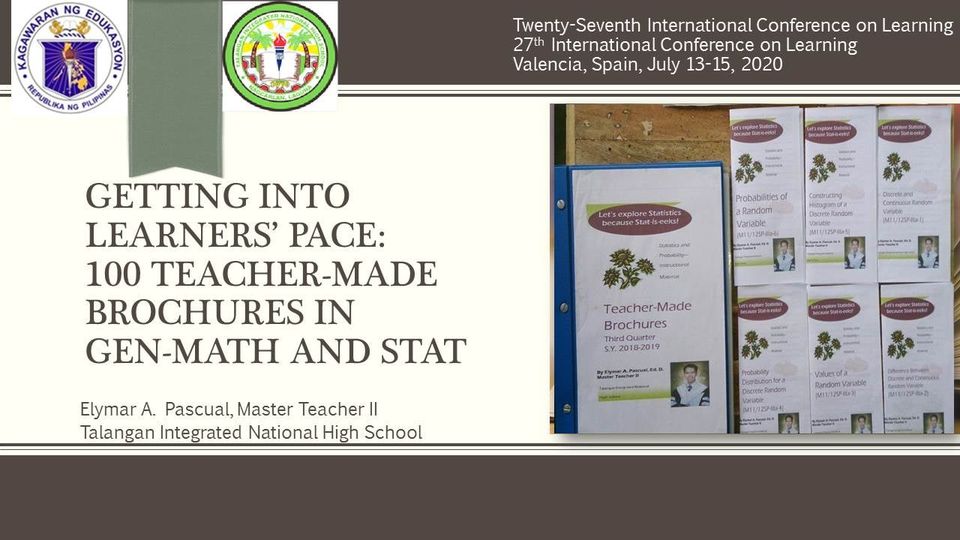
Getting into Learners' Pace: Teacher-Made Brochures in Gen-Math and Stat
This study focused on determining the effectiveness of the use of teacher-made brochures in Gen-Math and Stat-and-Prob subjects of Grade 11 learners in Talangan Integrated National High School, Nagcarlan, Laguna, s.y. 2018-2019. The researcher developed 100 teacher-made brochures and used them in classes. The experimental method of research was followed. The ABM-GAS section composed of 26 learners was divided into three groups (A, B, C). For three weeks, all the groups had their turn to be the controlled (no brochures were given), experimental 1 (brochures were given on the day of discussion), and experimental 2 (brochure were given a week before the discussion). Each week has three lessons with a 10-item quiz provided at the end of each session. Explanatory sequential mixed method was applied, i.e., after the gathering, encoding, statistical treatment, and analysis, a survey on the benefit of using brochures was conducted. It was found out that using brochure, the controlled group had a mean level of 6.22, experimental 1 group gained 7.01, while experimental 2 group obtained 8.13. The difference was found to be significant using ANOVA, proven by p-value 0.000 (alpha 0.05). Providing brochures to learners beforehand results into significantly high scores in quizzes. From the survey, the benefits of using brochures for learners are: (1) facility in taking down lecture notes (2) preparation for classroom discussion, (3) easy comprehension of the lesson, (4) motivation for learning, (5) material for enhancement of skill, (6) serves as review material, and (7) increased academic performance. For Math teachers, the following were highlighted: (1) facility on teaching, (2) lecture adaptation to interest and capability of learners, (3) reduction of stress, (4) teacher fulfillment, and (5) contingency material for teacher's unavailability. Recommendations to math teachers, coordinators, school heads, education program specialists, and future researchers were given at the end of the study.

Mathematics in Nature: A Pedagogical Approach
Most knowledge that we can acquire through discovery and investigation has been already known by the nature around us. It has the secrets long before we discover patterns, rhythm and calculations. This study was intended in exploring the unique way of teaching Mathematics through nature. Five individuals from different disciplines of study accepted the seven-day challenge of teaching pre-school learners on a one-on-one basis while observing Philippine Enhanced Community Quarantine in the fight against COVID-19. The lessons were nursery number sense which includes Counting 1-10, Days of the Week, Months of the Year, Ordinal Numbers, Counting 11-20, and The Time and Clock. Pre-and post- assessment of numeracy skills were recorded using observable competency tallied with literal descriptions - A for mastered, B for developing, and C for beginning. Alongside teaching, online conferencing was conducted for a qualitative interview with the teacher-participants. Questions revolved around teaching mathematics using nature as springboard. Responses were put into transcription, coded, thematically analyzed and discussed in the light of sound principles in teaching and learning.
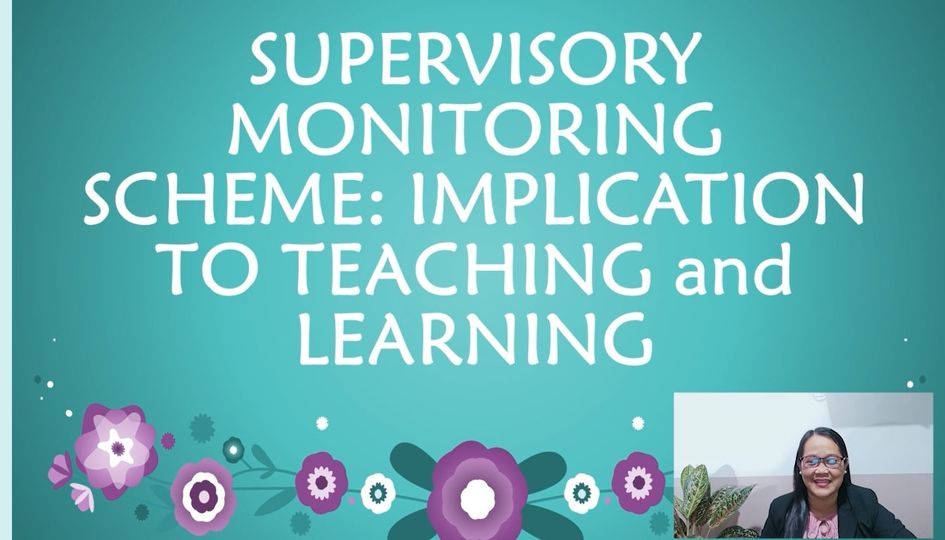
Supervisory Monitoring Scheme: Implication to Teaching and Learning
This study focused on determining the impact of supervisory monitoring scheme, particularly classroom observation on the learners' performance. Forty-two teachers from ten elementary schools in the district of Victoria, Laguna became part of the study by undergoing classroom observations and answering the survey questions pertaining to the (1) teaching-and-learning process, (2) learners' behavior, (3) teachers' and learners' enthusiasm, and (4) effect to learners' performance. The authors made use of qualitative technique in doing research as responses to qualitative questions were recorded, sorted and analyzed. Themes were developed in the responses of teachers as situations with and without classroom observations are compared and contrasted. Is there a difference in the performance of learners when there is no formal classroom observation and when there is a formal one? Do learners got intimidated to participate when there are observers, or are they more motivated? These and more other concerns about supervisory monitoring schemes were dealt in this study.

Efficacy of the Use of Different Teaching Approaches of Math Teachers
The main focus of this study is exploring the effective approaches in teaching Mathematics that is being applied in public schools, s.y. 2018-2019. This research was written as connected output to the district-wide School Learning Action Cell (DISLAC) on Math teaching approaches which was conducted in Victoria, Laguna. Fifty-four math teachers coming from 17 schools in Victoria became the respondents of this study. Mixed quantitative and qualitative methods of doing research were applied. Teachers' responses to the following concerns were gathered, analyzed and interpreted: (1) evaluation of the recently conducted DISLAC, (2) status of the use of different approaches, (3) perception on the effective use of approaches, (4) preference of approach to explore in classroom sessions, (5) factors affecting the choice of approach, (6) difficulties encountered, (7) and perceived benefit to learners. Results showed that the conduct of DISLAC was very highly satisfactory (mean 4.41). Teachers looked at collaborative approach as very highly effective (mean 4.74). Fifty-two percent of the teachers is using collaborative approach, 17% constructivist, 11% integrative, 11% inquiry-based, and 9% reflective. Reflective approach was chosen to be explored by most of the respondents (29%) in future sessions. The difficulties encountered by teachers in using the different approaches are: (1) learners' difficulty in following instructions, (2) lack of focus, (3) lack of willingness and cooperation, (4) teachers' lack of mastery in using different approaches, and (5) lack of time of doing visual aids because of time mismanagement. Teachers deemed the use of various teaching approaches can help the learners to have (1) mastery of competency, (2) increased communication, (3) improved confidence, (4) facility in comprehension, and (5) better academic output. The result obtained from this study can be used as an input for SLACs. Recommendations at the end of the study were given to school/district heads and future researchers.
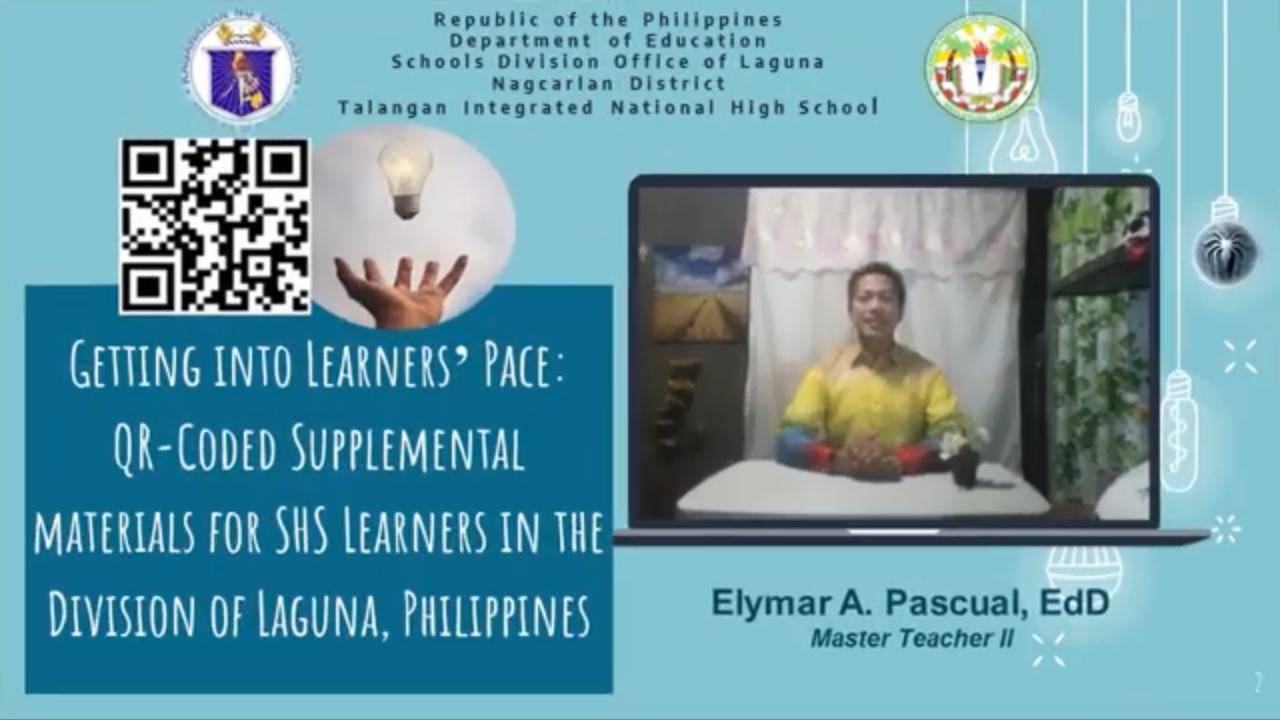
Getting into Learners' Pace: QR-Coded Supplemental Materials for SHS Learners in the Division of Laguna, Philippines
"QR" stands for "Quick Response", which refers to the instant access to the information hidden in the code. It is a two-dimensional version of the barcode, typically made up of black and white pixel patterns. Now, it has found its way into mobile marketing with the widespread adoption of smartphones. This study explored the use of QR Codes in educational setting. The QR-coded supplemental materials were used both in modular and online distance learning since both modality use weekly home-learning plan (WHLP) being distributed to students in a regular basis. They were attached to WHLP beside the General Mathematics subject for the students to scan using their smartphones. If they don't have the scanning application in their phones, they could just encode the affixed link in WHLP through Google engines and the teacher-made brochure will automatically pop out. Upon scanning or encoding the affixed link, the learners were able to have a glance of the supplemental material. Fifteen schools, from the Department of Education, Division of Laguna, Philippines, including the home school of the author, participated. The study made use of explanatory sequential mixed method of quantitative and qualitative approaches. Findings revealed that there is a significant increase in the academic performance of Grade 11 learners in the General Mathematics when QR-coded supplemental materials were used. Both learners and teachers highly agree that QR-coded supplemental materials have various benefits in lesson preparation and understanding of key concepts and competency in General Mathematics. Themes developed are (1) Easy access is a key to understanding and learning, and (2) Less time to browse, more time to help and teach. Reflection and challenge on continuing to make ways for knowledge to be accessible was given at the end of the study.
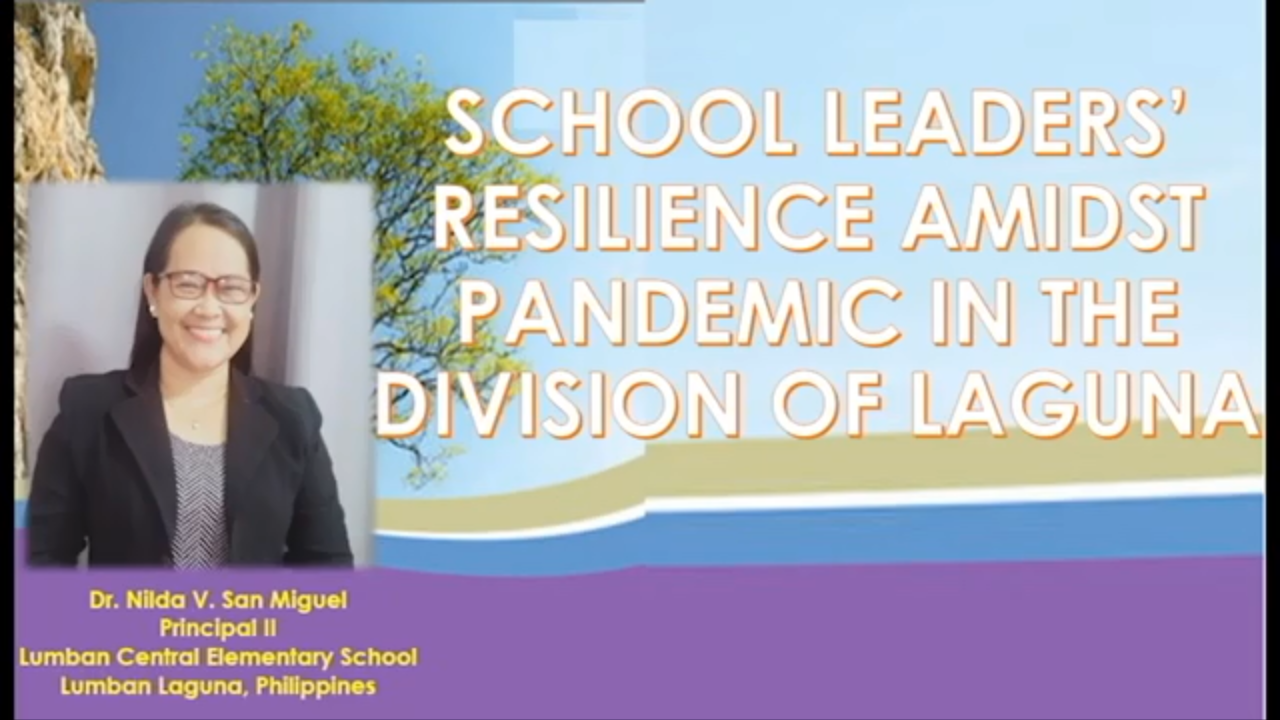
School Leaders' Resilience amidst Pandemic in the Division of Laguna, Philippines
COVID-19 is an unprecedented event that brings adverse effects to different countries, including the Philippines. This disease greatly affected education in the Philippines from March 2020 up to present. School heads' resiliency is one possible solution so that learning would continue. The Department of Education issued DepEd Order (DO) No. 012, s. 2020, stipulating that DepEd shall employ multiple learning delivery modalities (LDMs) to ensure the continued provision of learning opportunities to its learners, while protecting the health and safety of both its personnel and learners. This study looked into how school leaders in the DepEd Division of Laguna maintained themselves resilient. Additional highlight of this study is the investigation of how the school heads are implementing their enhanced school learning continuity plan this school year 2021-2022. With 73 school leaders participating in this study, it was found out that they have a very high resiliency level in four aspects - community cohesiveness, sustained communication, prioritizing mental and psychosocial health, and welcoming feedback. Also, the following themes were constructed: (1) All are called for unity, (2) Communication is what makes a group or team strong, (3) Health is wealth; prioritize it. (4) Listen to what feedback and survey say; they matter, (5) Proper delivery and monitoring takes learning at its best, (6) Quality technical assistance can breed quality learning, (7) Activities become meaningful when resources are shared, (8) Pandemic calls for alternative arrangement to safeguard health, (9) Support is essential, (10) Make them feel at home, not just special, and (11) Acquisition of fund is as important as proper utilization. Recommendations were given focusing on projects that can be initiated to sustain resiliency.

Online Consultation for Academic Assistance: Antidote for Distance Learning Complexity
Online consultation this time of pandemic is important for the teachers' awareness of the needs and interests of the learners in a particular subject. This study explored on the effectiveness of having online consultation in modular distance learning leading to learners' better output and academic performance. There was a weekly online consultation held for Practical Research learners through Google Meet application. This online intervention was deemed to enrich teaching and learning by having weekly consultation to learners who have specific needs in addressing the competency provided every week. The class officers of GAS and ABM were given task to collect questions for the week and facilitate in soliciting answers from the teacher during the event. This meeting was scheduled and was reflected in the Weekly Home Learning Plan distributed to learners in a regular basis. The study made use of explanatory sequential mixed method of quantitative and qualitative approaches. The participants were 51 grade 12 General Academic Strand (GAS) and Accountancy, Business and Management Learners (ABM) learners, while the respondents among the participants were 34. Findings revealed that there is a significant increase in the academic performance of Grade 12 learners in Practical Research 2 when weekly online consultation is implemented. Learners rated the different aspects of online consultation (facility in understanding, cost, timeframe and schedule, quality of output, and accommodation of teacher) as very highly satisfactory. The theme developed was focused on learners gaining knowledge: The implementation of weekly online consultation can help the students in learning as they ask questions to the teacher, producing a very good output. Reflection and challenge on building connections for better knowledge dissemination in this time of pandemic was laid down at the end of the study.
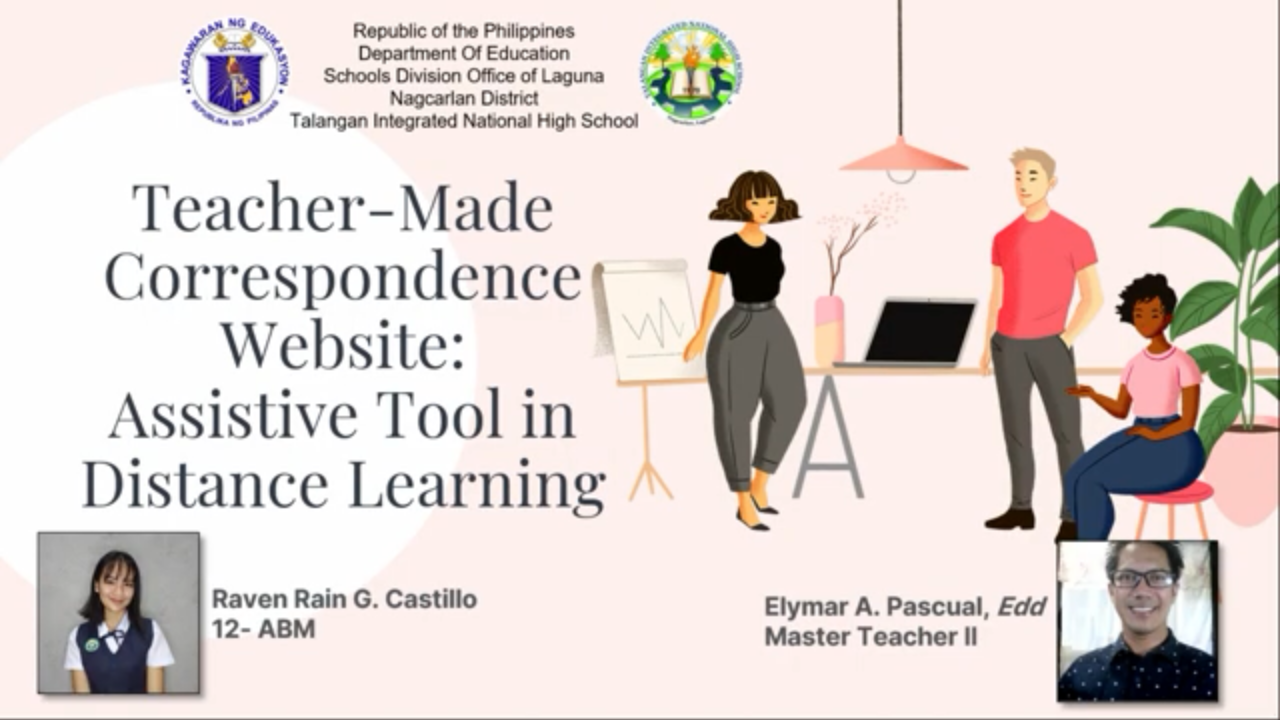
Teacher-Made Correspondence Website: Assistive Tool in Distance Learning
Correspondence can be found in a variety of media, including letters, memos, e-mail messages, text messages, fax messages, voicemails, and notes. Teacher-made correspondence website includes a portion where students can send questions or feedback in the webpage content through email where the teacher can respond to learners' concern. This study aimed at exploring the assistance that teacher-made website can provide to SHS learners, particularly in research subject. The link to the website portion was made visible in the Weekly Home Learning Plan (WHLP) which was distributed to learners on a regular basis. There were materials on the website that assisted learners every week, and students communicated with their teacher through the feedback portion. The study made use of explanatory sequential mixed method of quantitative and qualitative approaches. The participants were 51 grade 12 General Academic Strand (GAS) and Accountancy, Business and Management Learners (ABM) learners, while the respondents among the participants were 34. Findings revealed that there is a significant increase in the academic performance of Grade 12 learners in Practical Research 2 through the use of teacher-made correspondence website. Learners rated the different aspects of the website (correspondence or interactivity, clarity of content, graphics, relevancy of material, and teachers' accommodation to queries) as very highly satisfactory. The two themes developed were (1) Website is a very good help for learners in having a wide view of research topics, and (2) Correspondence website is helpful for teachers in meeting the academic concerns of students. Reflection and challenge on continuing to pursue ways for knowledge to be available even amidst world crisis was laid down at the end of the study.
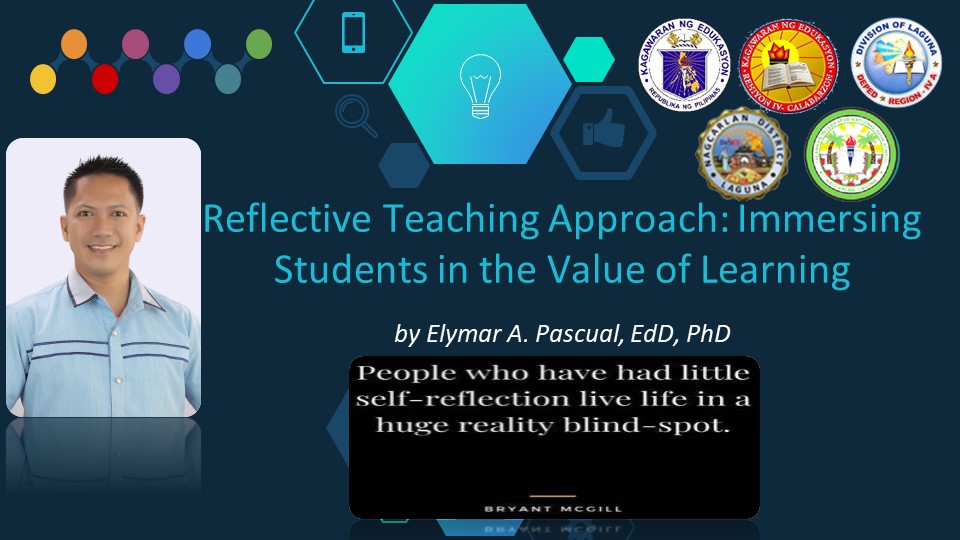
Reflective Teaching Approach: Immersing Students in the Value of Learning
As reflective teaching approach is one of the five approaches being promoted to be used for 21st century learners, alongside collaborative, constructivism, integrative and inquiry-based, it turns out that this approach is the least used, explored and studied. Learners nowadays are not into the habit of reflecting on their ways, their words and actions - they just want to hear from others and be elated on what others would say to them. This study focused on the investigation of the reflective teaching approach implemented in distance learning through the closure part of the teacher-made, QR-coded brochure being distributed as supplemental materials to learners, and the writing on the reflective journal as learners debrief themselves on the topic of the lesson in General Mathematics and Statistics & Probability. Thirty-two ABM learners during the school year 2020-2021 had their Mathematics performance without using reflective approach compared to the Mathematics performance of thirty-four ABM learners of school year 2021-2022, using reflective approach. Using t-test for independent sample means, it was found out that there is a significant difference in their performance, in that, learners perform better when reflective teaching approach was used. Online survey was administered to the 34 ABM learners who were exposed to reflective teaching approach and they rated the ethic of caring aspect of the approach as very highly satisfactory, ownership of learning as very highly satisfactory, practical sense as highly satisfactory, looking into cause or reasons as very highly satisfactory, and the self-checking aspect of the reflective approach as very highly satisfactory. Included in the online survey is the open-ended question which deals with the benefits of reflective teaching approach, and the theme generated from the responses is this: "Reflective teaching helps students understand better as it fosters view of real life, seeking reasons for learning and gaining knowledge that leads to professional growth in future." Recommendations were laid down for Mathematics teachers, Department of Education officials and curriculum developer.

Lived-Experience of Former ALS (Alternative Learning System) Students in Nagcarlan, Laguna, Philippines
The institutionalization of the Alternative Learning System in basic education in the Philippines (Republic Act 11510) last December 2020 paved the way for the out-of-school youth, adults, unreached, undeserved, conflict-affected communities, and communities in emergency situations to avail of systematic and flexible basic education program. The Department of Education in Nagcarlan is one of districts in Laguna, Philippines who is very passionate about this program, and through years of implementation, there were those who have even succeeded up to college graduation. This study focused on tracing those graduates and learning from them the struggles or obstacles they overcame going to college success. Six former ALS passers who obtained baccalaureate degree agreed to participate in this qualitative study. Through online survey containing five qualitative questions with follow-up inquiries through social media, the investigation of their path to success was documented. Responses were analyzed by developing themes from the patterns in their responses. The five major findings are as follows: (1) Education is a way of lifting ones status in life as a person mature in age, achieve dreams, and raise a family (2) Time management is the best way to grip ones responsibilities in terms of having a family, work and household chores (3) Lack of opportunities, worries, fulfilling a dream of finishing secondary school and being a different person are the perspective of ALS students (4) College study poses to ALS passers a survival-of-the-fittest in education as insecurities, struggles, fear and pressure are present to stop them, but with the help of others and self-determination, they are able to conquer all those obstacles and (5) Despite having difficulty in time management, financial instability, and adjustment to new lessons, ALS passers chose to be inspired, work hard, be patient and diligent for them to overcome obstacles. Recommendations were laid down for out-of-school-youths, adults, families, Department of Education officials and future researchers at the end of the study.
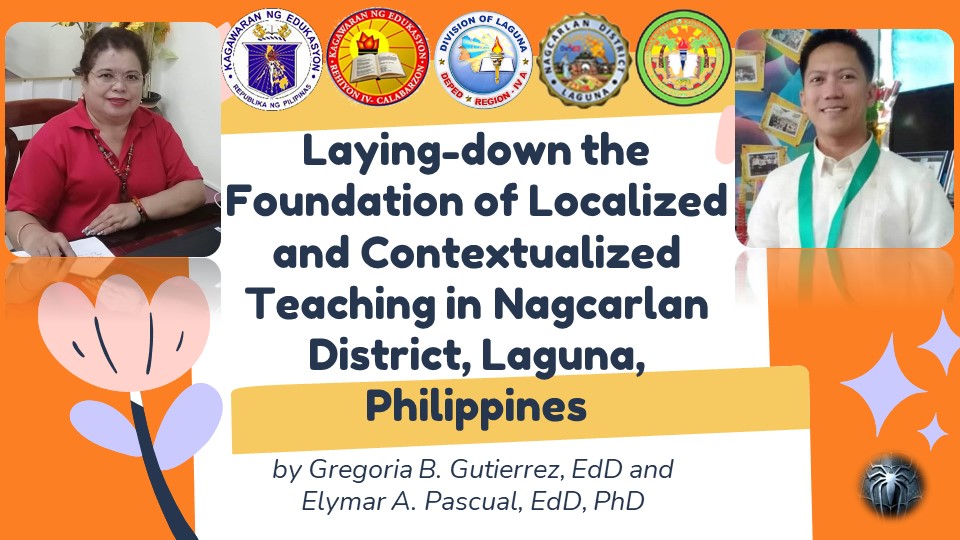
Laying-down the Foundation of Localized and Contextualized Teaching in Nagcarlan District, Laguna, Philippines
Ever since the promulgation of the Enhanced Basic Education Act (R.A. 10533), the curriculum in Philippine setting has always been emphasizing the localization and contextualization of teaching (Section 5.d.). Lots of studies have been done to realize this mandate into different localities but none yet in DepEd Nagcarlan. This study focused on laying down the foundation for localized and contextualized teaching in Nagcarlan, Laguna, Philippines. Seven master teachers responded to the call of being the participants for this qualitative research. Nagcarlan profiles were inquired of them, plus the localization and contextualization strategy that can be implemented based on the five main aspects (Filipino values, sources of income and business establishment, tradition and beliefs, products and specialties, and current issues and other pertinent data). Seven themes turned into foundations were developed: (1) Nagcarlan values family, eternal debt of gratitude, social acceptance, social mobility, benefactor-hero complex and closeness to God (2) Farming, commodity stores, bakeries, resorts, restaurants, nature tours and transportation services are the primary sources of income (3) Beliefs and traditions hold Nagcarleňos together as history unfolds, festivities continue to be celebrated, and virtues are handed down to present generation (4) Highlands produce crops and vegetables while lowlands produce bakes, pastries and candies (5) Nagcarlan, having a growing economy has positive reports in demographics and poverty index, but unavoidably has problems to watch for as part of advancement (6) Localization in teaching can be realized by replacing distant materials or concepts to the ones available in the immediate environment and (7) Contextualization in teaching can be realized by designing activities that meets the needed requirement of the curriculum while using the issues, needs and concerns of the Nagcarleňos. Recommendations to teachers, school heads, higher officials, and future researchers were laid down at the end of the study.
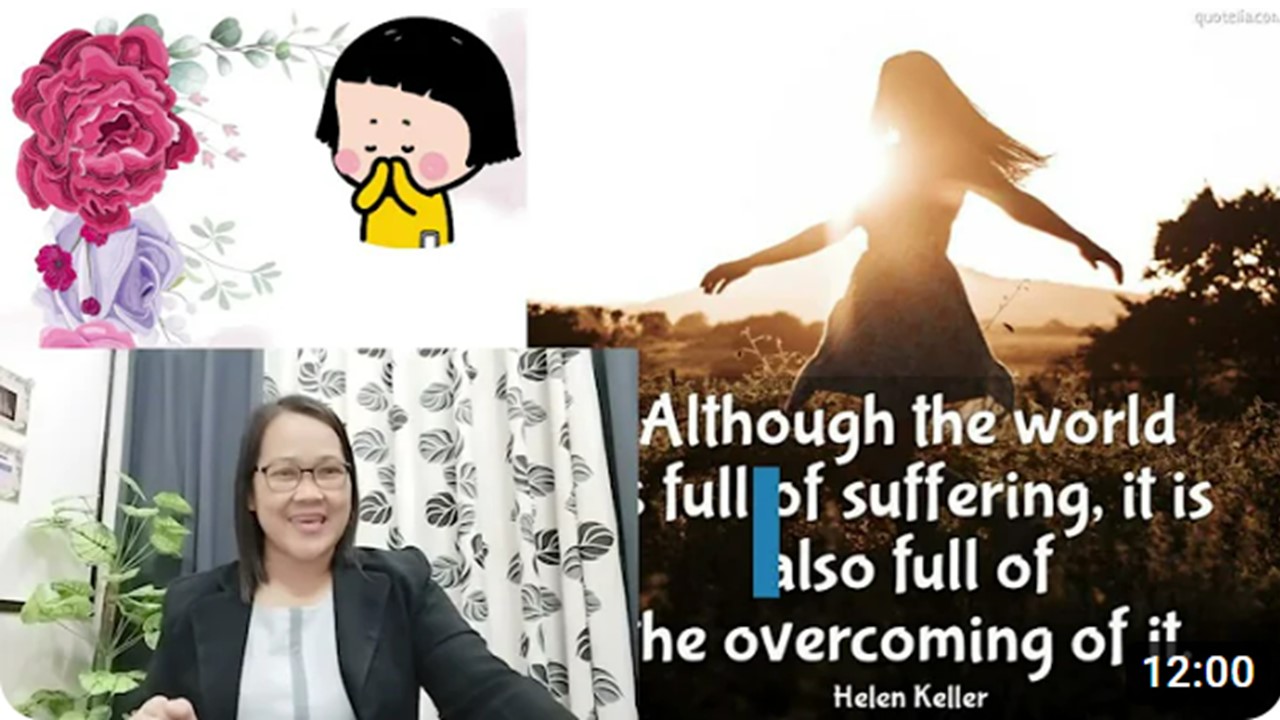
Localized Undertaking Using Mobile Video Attachment in New-normal (Project LUMVAN) in the Teaching and Learning Continuity amid Pandemic
The study looked at the issues and concerns that have arisen with regards to teaching and learning continuity as a result of the COVID-19 outbreak in public elementary schools in Lumban District, Laguna. The Localized Undertaking using Mobile Video Attachment in New-Normal aims to provide a solution to the current challenges of mobile learning by providing teachers with video clips and recorded lessons so that they can educate their learners on the go. This project is about making it easier for learners to learn by creating a platform where educators can record their lessons and upload them, so that learners can watch the lessons whenever they want. This project ensured that students are always learning, even when they're not in school. Further, the audio format helped the students to absorb information more easily because they could listen to their teachers rather than read them. Students learned not just by reading the modules but also through the video clips created by their teachers. These videos will be added to a "video library or folder" that students can access online. This study is focused on the mixed quantitative and qualitative in the Department of Education, District of Lumban, Laguna. With eleven participating public elementary schools' data managers. It was found out that there is a significant difference between the academic performance of learners with and without the use of Project LUMVAN.
Reach me at...

N & E Quality Provider
Educational Research Center
https://web.facebook.com/N-E-Quality-Provider-102494395066344
https://www.youtube.com/watch?v=FT4qMeFZzNM
117 Sitio 4, Brgy. Oogong, Sta. Cruz, Laguna
Mobile: 0936-2700927
Email: elymarpascual@rocketmail.com
Mon - Fri: 8:00am - 5:00pm
Sat - Sun: 5:00pm - 7:00pm